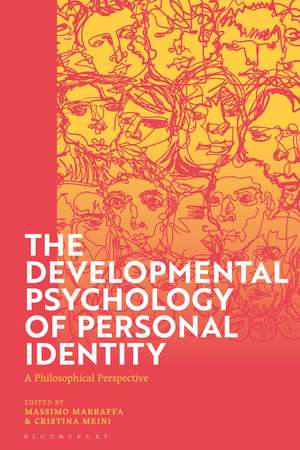The Developmental Psychology of Personal Identity: A Philosophical Perspective
Editat de Massimo Marraffa, Cristina Meinien Limba Engleză Hardback – 20 mar 2024
Preț: 510.68 lei
Preț vechi: 731.36 lei
-30% Nou
Puncte Express: 766
Preț estimativ în valută:
97.73€ • 101.66$ • 80.68£
97.73€ • 101.66$ • 80.68£
Carte tipărită la comandă
Livrare economică 14-28 aprilie
Livrare express 08-14 martie pentru 119.63 lei
Preluare comenzi: 021 569.72.76
Specificații
ISBN-13: 9781350368996
ISBN-10: 1350368997
Pagini: 240
Dimensiuni: 156 x 234 x 18 mm
Greutate: 0.52 kg
Editura: Bloomsbury Publishing
Colecția Bloomsbury Academic
Locul publicării:London, United Kingdom
ISBN-10: 1350368997
Pagini: 240
Dimensiuni: 156 x 234 x 18 mm
Greutate: 0.52 kg
Editura: Bloomsbury Publishing
Colecția Bloomsbury Academic
Locul publicării:London, United Kingdom
Caracteristici
Traces a philosophical history of identity through canonical figures such as John Locke and William James
Notă biografică
Massimo Marraffa is Professor, Department of Philosophy, Communication and Performing Arts, is Professor, Department of Philosophy, Communication and Performing Arts, Roma Tre University, Italy.Cristina Meini is Professor, University of Eastern Piedmont, Vercelli, Italy.
Cuprins
Introduction: Locke, James and Subjective Identity 1. The toolbox 1.1. The Jamesian Self in the Framework of Darwinian Naturalism 1.2. From the Hobbesian Individual to the Mother-Child Dyad 1.3. In search of a synthesis between individual constructivism and sociocultural constructivism 2. Self-consciousness in its simplest form: the perception of a physical identity 2.1. The initial state: sensitivity to contingency 2.2. Ecological self and pre-reflective self-consciousness 2.3. The link between self-consciousness and identity 2.4. Bodily self-consciousness 3. The recipe for emotional introspection 3.1. Emotions in the body 3.2. A socio-constructivist model of emotional introspection 3.3. Basic emotions and affect programs 3.4. Forms of vitality 3.5. Core affect and the process of emotion construction 3.6. Forms of vitality and background feelings 3.7. Beyond emotions: simple desires 3.8. What about beliefs? 4. Naïve psychology 4.1. Attachment and mindreading 4.2. Naïve psychology: the early stage 4.3. Naïve psychology: mindreading 4.4. Concluding remarks 5. Expanding introspective space 5.1. The self/other parity 5.2. Inner sense theories 5.3. Sensory access and self-interpretation 5.4. Turning our mindreading skills upon ourselves I: inner speech 5.5. Turning our mindreading skills upon ourselves II: naïve ethics 6. Subjective identity as a unifying and meaningful story 6.1. Identity and memory 6.2. From a bodily self in time to a psychological one 6.3. Narrative identity6.4. Dissociation of the Jamesian selves 7. The defensive nature of self-consciousness 7.1. A clarification regarding the psychodynamics of defenses 7.2. The construction and defense of identity is the cornerstone of the development of the entire existence of the individual 7.3. Building and defending a strong sense of identity as the foundation of psychological well-being and mental health 7.4. Self-memory system, inner working models and autobiographical arguments 7.5. Individuation and eudaimonia Conclusions References Index
Recenzii
Marraffa and Meini virtuously integrate the psychology of identity with its philosophical roots and substantiate both with empirical (neuro-)psychological research. This beautiful journey through the developmental history underscores that personal identity is a necessity of personhood, making it a must-read for those intrigued by self, personality, and autobiographical memory.
A systematic critical exposition of a form of individual constructivism on the nature and development of personal identity as narration , with an original approach of the ways to the formation of the human 'sense of the self 'through bodily self-awareness , emotional introspection, attachment phenomena and defensive constructions . A useful introduction to the philosophical history of the question and to the status of contemporary research in cognitive sciences.
A systematic critical exposition of a form of individual constructivism on the nature and development of personal identity as narration , with an original approach of the ways to the formation of the human 'sense of the self 'through bodily self-awareness , emotional introspection, attachment phenomena and defensive constructions . A useful introduction to the philosophical history of the question and to the status of contemporary research in cognitive sciences.
